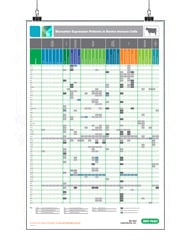Canine Diseases

- On This Page
- Canine parvovirus
- Canine distemper virus
- Rabies
- Heartworm
- Canine Disease Antibodies
Biomarker Expression Patterns Posters
s
Like most species, dogs can be infected by all pathogens; parasites, bacteria, fungi, and viruses. Among the most prevalent are:
- Viruses - canine influenza, rabies, distemper, and parvovirus
- Parasites – heartworm and intestinal parasites such as roundworm, hookworm, whipworm, and tapeworm
- Bacteria – kennel cough and leptospirosis
- Fungi - blastomycosis, histoplasmosis, cryptococcosis, and coccidioidomycosis
Below are the areas where we can currently assist with canine disease research, in terms of providing useful antibodies and resources.
Canine Parvovirus
Canine parvovirus (CPV) shares 98% homology with feline panleucopenia virus (FPV). It enters cells by way of the transferrin receptor, leading to acute disease in dogs. In neonatal animals, mitotically active cells are affected, leading to myocarditis. In older dogs a systemic infection occurs that targets primary and secondary lymphoid tissues as well as small intestinal epithelium.
To detect CPV and FPV use our anti canine/feline parvovirus monoclonal antibody (clone CPV1-2A1, MCA2064), performance guaranteed to work in ELISA and on paraffin sections.
Find out more about CPV and available antibodiesCanine Distemper Virus
Canine distemper virus (CDV) is a negatively stranded RNA morbillivirus. CDV infection induces a systemic, often fatal disease in a broad and expanding host spectrum among the carnivora. It is highly contagious, and transmission occurs predominantly via aerosols, resulting in neuroinvasiveness and severe immunosuppression.
Mortality rates during canine distemper virus outbreaks can exceed 80%.
Find out more about CDV and available antibodiesRabies
Bio-Rad has a range of antibodies to help combat rabies, including:
- 7924-1008 - Mouse Anti-Rabies Virus, clone Rab-50
- MCA2828 - Mouse Anti-Rabies Virus Glycoprotein, clone 1C5
- OBT0874 - Mouse Anti-Rabies Virus, clone 6041
Heartworm
Bio-Rad offers an antibody suitable for detecting heartworm in ELISA and western blotting.:
- MCA2554 - Mouse Anti-Canine Heartworm, clone HW1-39
Our full range of canine disease antibodies is below. If you can't find what you are looking for or need further assistance, please do not hesitate to contact us.
Canine Disease Antibodies
| Description | Target | Format | Clone | Applications | Citations | Code |
|---|



